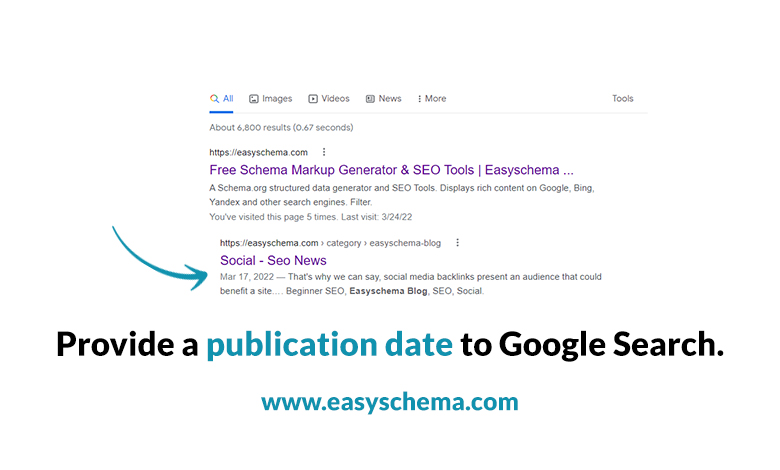When Google determines the dates and updates of a site or video, it may extract information from search results if clients consider it accurate. You can give information to help Google determine publication and update dates. Google does not depend on one factor because all sorts of elements can be prone to problems, which is why systems look at only a few factors to determine our assessment of when a site is published or updated.
Note: The actual view may differ in the search results.
How to provide date information on Google?
To give date information to Google, follow these steps:
Follow the instructions.
Add a visible date to the page and place it prominently. Tag your dates suitable with text like “Publish” or “Last Updated.” Below are some examples of publication and update dates:
Posted on February 4, 2019
Published on February 4, 2019
Last update: February 14, 2018
Updated February 14, 2019, 8:00 PM ET
You can provide a publication date or an updated last date.
<html>
<head>
<title>Analyzing Google Searchtraffic drops</title>
</head>
<body>
<p>Posted Tuesday, July 20, 2021</p>
<p>Assume you open Search Consoleand discover out that your Google Search traffic dropped. What should you do?</p>
</body>
</html>Specify dates with structured data. We recommend that you add a CreativeWork subtype (such as Article, blog posting, or VideoObject) and specify datePublished or dateModified domains (see instructions for AMP and non-AMP sites). Be sure to follow Google’s structured data guidelines to help our crawlers understand the dates of your articles.
<html>
<head>
<title>Analyzing Google Search traffic drops</title>
<script type="application/ld+json">
{
"@context": "https://schema.org",
"@type": "NewsArticle",
"headline": "Analyzing Google Search traffic drops",
"datePublished": "2021-07-20T08:00:00+08:00",
"dateModified": "2021-07-20T09:20:00+08:00"
}
</script>
</head>
<body>
<p>Posted Tuesday, July 20, 2021</p>
<p> Suppose you open Search Console and find out that your Google Search traffic dropped. What should you do?</p>
</body>
</html>GUIDELINES
Google is not that date if it guarantees, will do or structured to do in search results, follow guidelines to help our algorithms.
The date is required; time is not: Part of the time is optional in data records as data and structured by identity.
If you select a specific time, provide accurate time data, considering the time of day as appropriate.
Your essential data and schedules. Make sure the data (and optional time and time zones) match between equivalent values , which are known from the ideas and structured deals. Time and time zones are functional in identity declaration data, even if they are in the same structure.
Do not specify other data or data validity dates on the page. Dates should describe the date of the update or change, not the page publishing history of the site here. If you wish, you can place event markup on the pages for the activities listed on the page.
Minimize other data on the page: If you have practiced best practices and find that you are selecting incorrect data, consider removing some additional data, not on the page.
If your site is intended to be found in a Google News search, include these additional guidelines.
Credit/ Some information is taken from the official Google documentation page.




